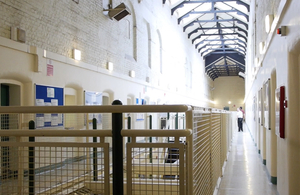New Prison Education Service to cut crime
Overhaul of learning behind bars to include specialist teaching staff, apprenticeships and digital reading tools.

- new Prisoner Education Service to get more offenders into work on release – keeping public safe
- in the past 6 months 4 prisons have received a ‘Good’ rating for education provision from Ofsted.
Learning in jails is to be completely transformed through the introduction of a new Prisoner Education Service as part of a renewed push to skill up offenders and protect the public (28 September 2023).
Evidence shows most prisoners have poor levels of education, with almost half of all offenders having been previously expelled from school and just a third having the expected maths and English ability of an 11-year-old.
The government’s new Prisoner Education Service will include:
- New Head of Education Skills and Work roles in every prison, working hand in glove with the Governor to provide tailored education plans to meet the needs of their jail
- The first ever prisoner apprenticeships in catering and construction through ground-breaking partnerships with Greene King, Kier and Clipper, with talks underway to open up apprenticeships in other industries.
- An extra £1.8 million invested to raise literacy rates as well as a new digital literacy app for prison leavers. Based on the ‘Turning Pages’ learning model, the app provides users with support from a dedicated coach and allows individuals to set personal goals such as learning to read a letter from their family or write a CV.
- New Neurodiversity Support Managers in every prison to support offenders with neurodivergent needs in accessing education, skills and work opportunities within the prison.
- Launching the Future Skills programme that will train up over 2,000 offenders over the next two years in vital industries such as scaffolding and electrics, before linking them up with employers in the local community and guaranteeing interviews on release.
- New contracts for education providers with tough targets on maths, English and vocational qualifications, and quality of delivery – to ensure every prisoner can finish their sentence with a basic level of English and maths.
- To further drive innovation and encourage creativity, prison governors in five prisons will be given increased freedoms on how they organise prison education, skills and work opportunities in their prison.
The new service is a cornerstone of the Prisons Strategy White Paper – and is the latest step in a package of measures to revolutionise learning behind bars and better prepare offenders for life on release.
This work to overhaul education in prisons is already well underway, and seeing positive results.
The number of prisoners in work following release more than doubling between 2021 and 2023, and in the past 6 months 4 prisons have received a ‘Good’ rating for education provision from Ofsted.
As part of this commitment the prison service is continuing to forge a closer working relationship with the education inspectorate, Ofsted, who have been delivering education sessions to prison leaders to ensure greater collaboration and clear expectations for prison education.
Prisons Minister Damian Hinds said:
Just as criminals must repay their debt to society, a forward-thinking prison system must give prisoners an alternative to the cycle of reoffending, and one of the best ways to do this is through education.
Our improved Prisoner Education Service with specialist staff, tougher targets and increased focus on employment will be more effective at cutting crime and keeping the public safe. I am grateful to Ofsted and the Chief Inspector of Prisons for their work championing this issue.
Ofsted’s Chief Inspector Amanda Spielman added:
I warmly welcome this investment to support the much-needed improvements in education, work and skills provision in prisons.
I look forward to continuing our work with the MOJ to make sure that education is a priority in prison, making a real difference to prisoners’ lives post release.
This announcement delivers on a key pledge in the Prisons Strategy White Paper to better protect the public by getting more prisoners skilled up while behind bars so they can find work on release – cutting crime, keeping the public safe, and reducing the £18 billion a year cost to society of reoffending.
Today’s announcement builds on work to get more prisoners skilled up while behind bars so they can find work on release, better protecting the public and reducing reoffending.
Ministers have already set up new Employment Advisory Boards – now up and running in all 92 resettlement prisons – which link up prisons to leading businesses, such as Co-op, Greggs and Iceland, to provide advice on how to get offenders into work on release.
Prisons have also continued to rollout Storybooks Dads and Mums, which helps over 5,000 prisoners a year record bedtime stories for their children, and rolled out new technology, including laptops for prisoners to take part in online courses with the Open University.
Today’s launch also coincides with the launch of the Future Skills Programme, running courses targeted at industry in prisons with direct links to employers. Courses will be delivered from autumn 2023 to spring 2025 in up to 23 prisons across England and Wales, reaching around 2,200 prisoners, who will be trained and offered guaranteed interviews for jobs on release in a variety of roles including scaffolders, electricians and case workers.